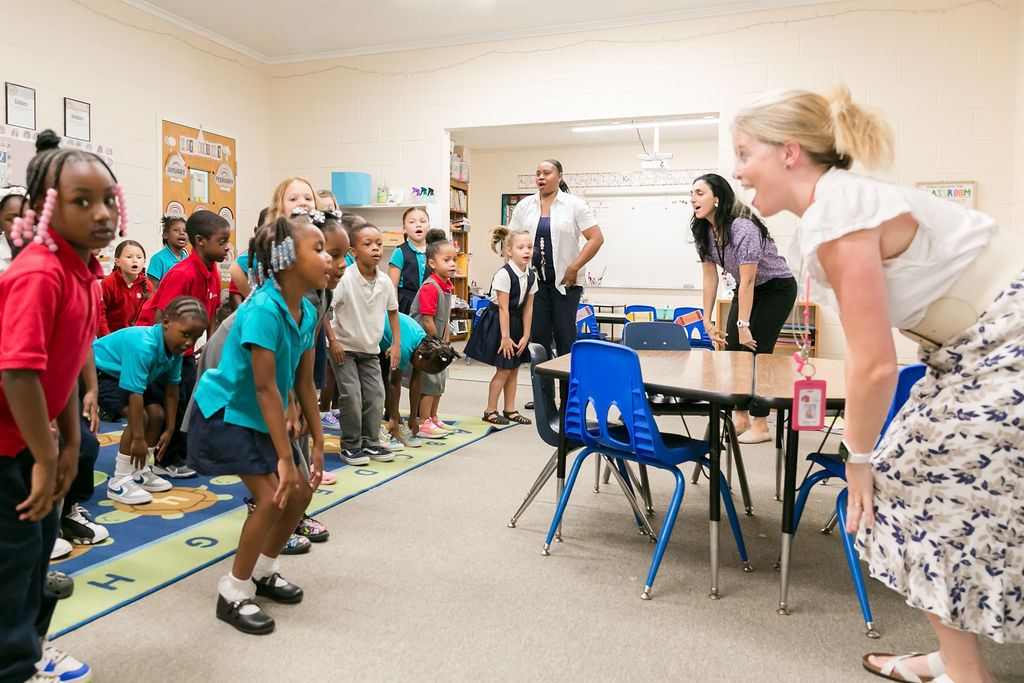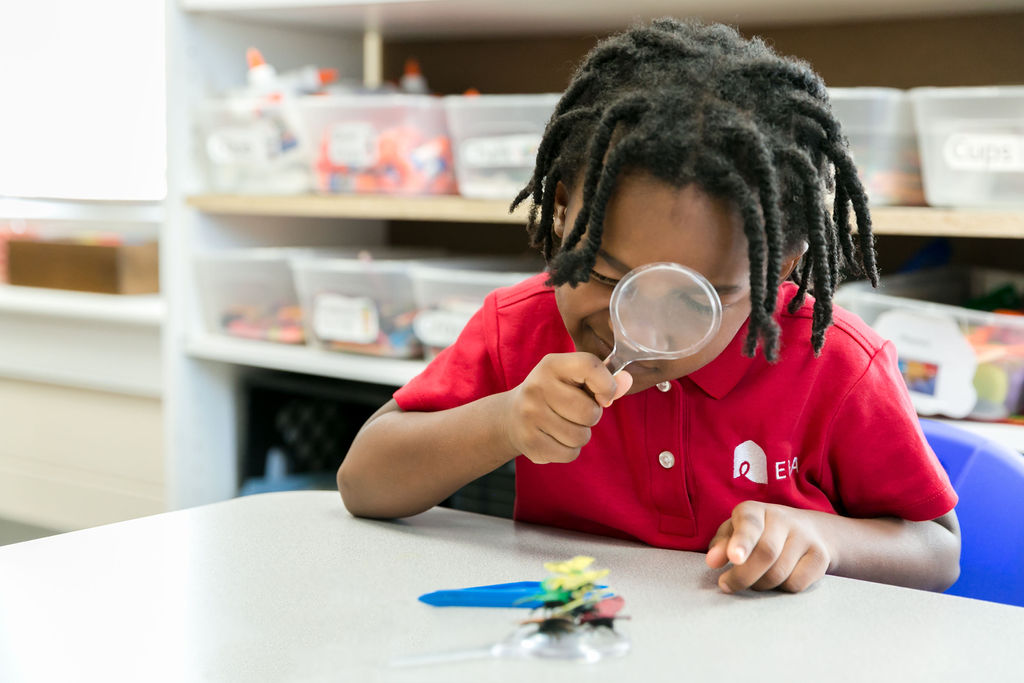


At Elijah House Academy, our philosophy of education rests solidly upon the foundation of God’s revelation. The entirety of creation, the Holy Scriptures and the person of Jesus Christ sufficiently reveal our reasons for educating and the principles by which we do so. Our philosophy of education ultimately advances our purpose of providing a Christ-centered and accessible choice in education that empowers our city’s children to discover their true identity, dignity and purpose in God’s mission to redeem all things.
The purpose of education is to cultivate a love of learning within students, enabling them to glorify God through loving Him and loving their neighbors as themselves.
The purpose of education is to cultivate within our students the tools of learning that lead to Christ-centered knowing, loving, working, and worshiping. The result of education must be growth in righteousness and evangelism, building faithful stewards of culture and of a just society. The ultimate aim of education is to promote obedience to the two greatest commandments, loving God and loving neighbor, both in thought and in deed; we strive therefore to give our students both the tools to think rightly and habits that are rightly aligned to the Word of God.
Because parents have the God-given responsibility to educate their children, a strong partnership between the home and the school is necessary.
Deuteronomy 6 teaches us that the responsibility for a child’s education lies with her parent(s) or guardian(s). It is natural then that the first and most formative classroom is the home. Within these walls and through the instruction of the parent(s), the child will develop her thoughts, language, emotions and habits. For this reason, EHA seeks to partner with the parent(s) in the process of education based on shared vision and values. We deem it a great honor to serve the families of Richmond in this way.
Our students (and staff) are created in the image of God; they are also marred by sin.
In Scripture, we see clear truths emerge that help us understand the nature of our students. First, we see in Genesis 1 that each of our students is made in God’s image. Therefore, regardless of the situation, they must be treated with respect and dignity according to the infinite value inherent in them as God’s most special creation. Second, each of our students is marred by sin. All of our students are deeply affected by sin, both by the brokenness of the world and by the depravity of their own hearts. The good news is that through the person and work of Jesus Christ, God has provided a remedy so that each of our students may be restored to right relationship with their heavenly Father. This restorative process renders students better able to become the learners God created them to be.
We believe the teacher and all other staff are also broken image-bearers of God. Recognition of this shared human condition deepens our sense of community and fosters relationships characterized by our core values of kindness, respect, empathy and hope.
Finally, we believe that because every child and teacher is an image-bearer, he is fully a person and should be treated accordingly.
The teacher should cultivate a classroom atmosphere that balances form and freedom.
We believe the teacher properly holds the authority in the classroom, and ultimately this authority is for the flourishing of the student. The teacher serves her students by cultivating an atmosphere in which classroom structures allow students to learn freely and creatively. We use habit formation to create an orderly environment in which our children’s energy will be fully available for learning. Our classrooms are places where justice and grace coexist as we seek to understand and shepherd the hearts of our students. The teacher plays many roles, all of which contribute to a feast of active, student-centered learning.
Discovery is better than delivery.
We believe that learning is an essential component of our personhood, ordained by God. Children are curious when they come to us; we must be careful to fan curiosity’s flame and not smother it. Part of our work, then, will be intentionally winning and stewarding the cooperation of the children in the instructional process. We seek their hearts in order to engage their will and tap into their internal motivation to learn.
We encourage our children to take action on a variety of tasks without fear of making a mistake, believing that things discovered by the learner are internalized better than things that are delivered. We recognize the need for a robust knowledge base and assign to teachers the responsibility for seeing that every child acquires it. In that process, our approach both to teaching and to assessing should mimic God’s approach to us, wherein the edification of the student has priority over the passing of judgment on his achievement.
Our educational processes are as formative as the content we teach.
Process and content work hand-in-hand in many ways. Content–what is taught in the classroom–should be considered in tandem with process – the way content is taught in the classroom. Acknowledging that bodies of basic knowledge are crucial to a child’s education, we find that this knowledge is both more easily acquired and more fully utilized when educators value the curiosity of children and provide them with opportunities to explore, read and think. We want our students to catch from us the joy we find in learning and the high value we place on learning how to learn; to this end, we encourage questioning, challenge students’ thinking, and provide opportunities for them to confront ideas and problems that are meaningful to them.
The formation of habits that foster a love of learning is education.
The practices that we knowingly (or unknowingly!) engage with form habits. These habits in turn shape what we love, and that which we love directs the pathways of our life journey. We desire to cultivate young men and women of character and virtue, and the formation of habits will be a primary tool. Our “I am, I can, I ought, I will” statements help frame this work. If a child knows she is an image bearer of her Creator, understands the empowering grace of Christ and recognizes her thoughts, then her will can be shaped to love God, herself and her neighbors.
Developing a love for and a mastery of content happens through an unhurried approach to education.
The Latin phrase multum non multa, which translates “much, not many,” is utilized in the classical tradition to express the preference for thorough study of a few subjects over hasty exposure to many. We find in this phrase a critique of the modern approach to education in which the curriculum has come to be seen as something that must be “gotten through.” We believe a better approach is one that is unhurried, allowing time for students to enjoy and master the content or process being presented.
“Living” or “great” books expose our students to the best ideas, and these ideas are primary initiators of good thought and action.
We believe in inviting our students to discover the shared joy and wisdom of the human experience available to us in the great literature of diverse past cultures. Following exposure to these rich ideas, our students gain practice in evaluating and applying them by engaging in thoughtful conversations. Through readings in a wide range of genres, authors, topics, cultures and religions, our students develop both a love for reading and an understanding of the Christian worldview. Along with moments of laughter from reading for pure enjoyment, we cherish the community, empathy, and self-discovery that inevitably spring from the reading and sharing of great books.
Assessments should guide instruction and be used as a tool to improve student learning.
We believe that formative assessments utilized in the midst of the instructional process provide a rigorous and continual support for learning that is to be valued equally with the summative assessments which indicate the students’ level of mastery at the end of a unit of study. These assessments help the teacher understand her students’ status in relation to the content and provide opportunities for re-teaching or differentiated instruction. We favor authentic assessments, both formative and summative, in which the students move beyond the recall of facts and apply their new knowledge to real situations.